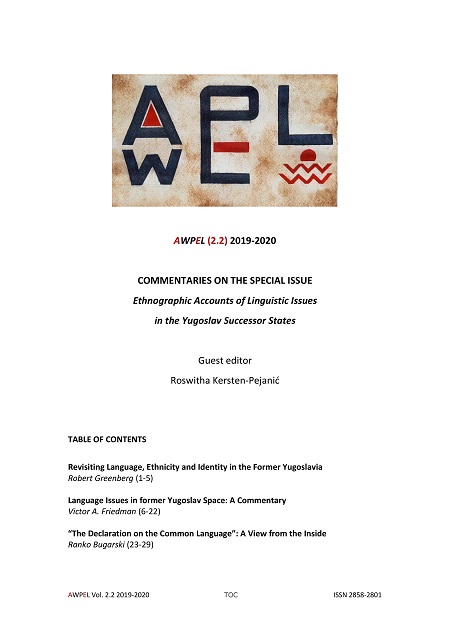Revisiting Language, Ethnicity, and Identity in the Former Yugoslavia
Abstract
This special edition on the language issues in the former Yugoslav space (AWPEL 2.1) provides some new perspectives and approaches to the study of the interplay of language, ethnicity and identity among the peoples of the former Yugoslavia. When I first began focusing on this topic in the early 1990s, the sociolinguistic and ethnographic linguistic literature on the peoples and languages of this multi-ethnic space seemed to be in its infancy. This volume reveals that the case of the former Yugoslavia has proven to be a fruitful field for scholarship in these areas of linguistic inquiry. It is pleasing to see here how younger researchers approach the complex issues arising from the breakup of Yugoslavia and the disintegration of the joint language formerly known as Serbo-Croatian or Croato-Serbian. [...]
Article Details
- How to Cite
-
Greenberg, R. (2020). Revisiting Language, Ethnicity, and Identity in the Former Yugoslavia. Aegean Working Papers in Ethnographic Linguistics, 2(2), 1–5. https://doi.org/10.12681/awpel.22589
- Section
- Articles

This work is licensed under a Creative Commons Attribution 4.0 International License.
Authors who publish with this journal agree to the following terms:
Authors retain copyright and grant the journal right of first publication with the work simultaneously licensed under a Creative Commons Attribution licence that allows others to share the work with an acknowledgement of the work's authorship and initial publication in this journal.
Authors are able to enter into separate, additional contractual arrangements for the non-exclusive distribution of the journal's published version of the work (e.g. post it to an institutional repository or publish it in a book), with an acknowledgement of its initial publication in this journal.
Authors are permitted and encouraged to post their work online (preferably in institutional repositories or on their website) prior to and during the submission process, as it can lead to productive exchanges, as well as earlier and greater citation of published work (See The Effect of Open Access).



